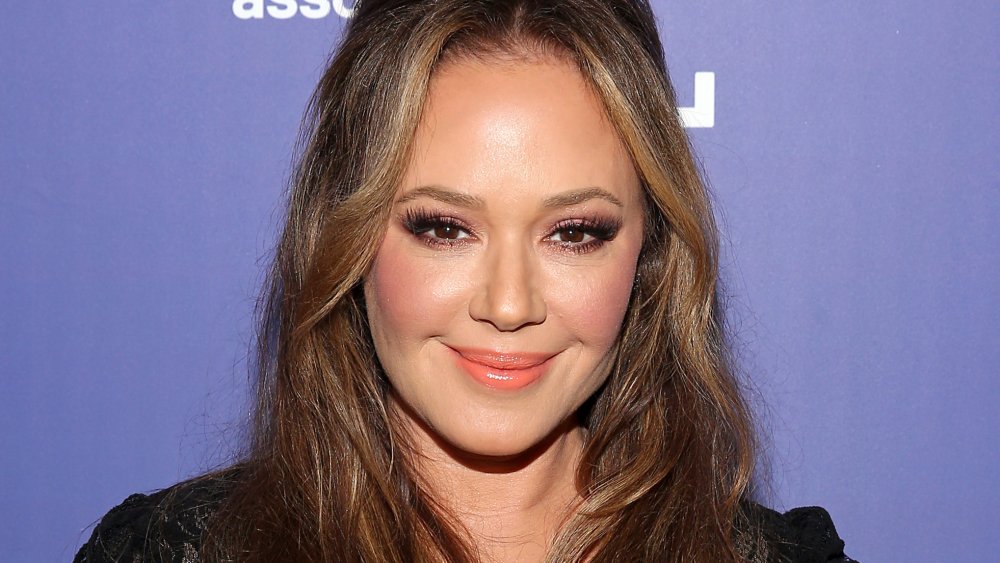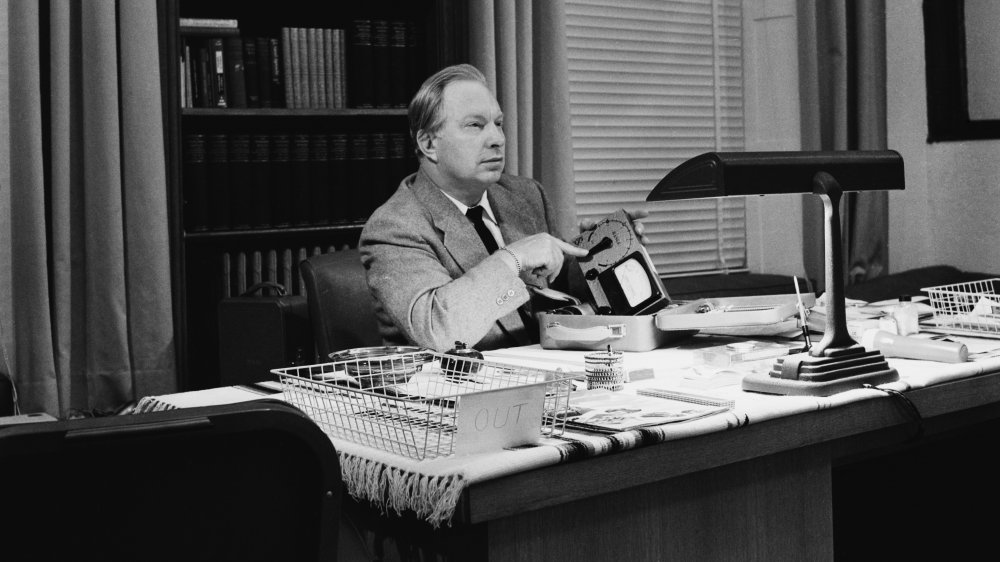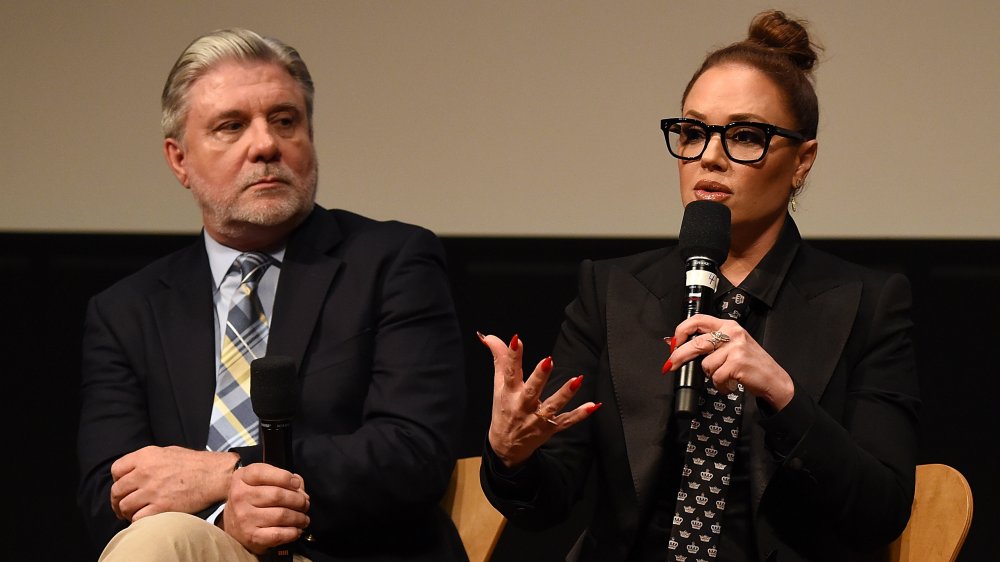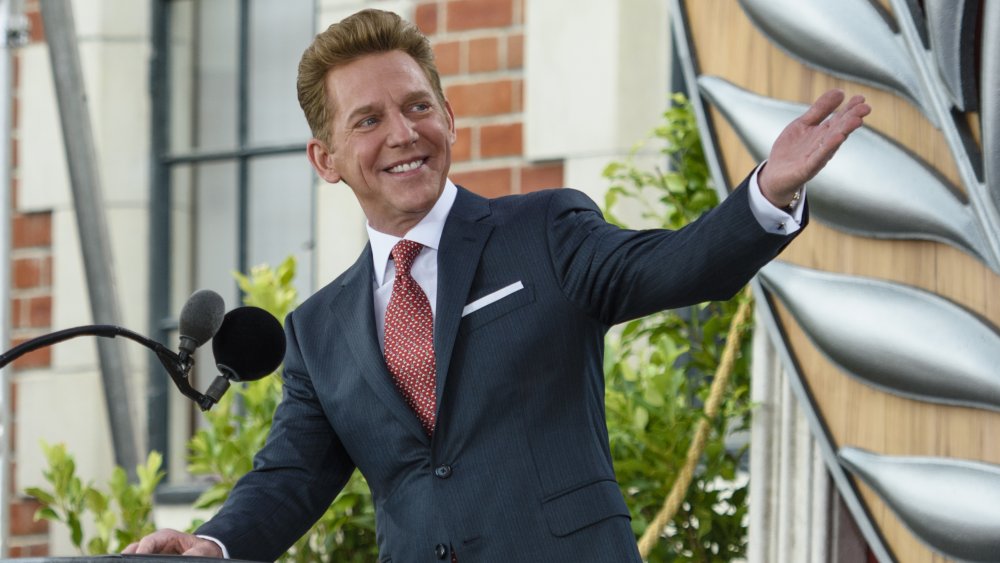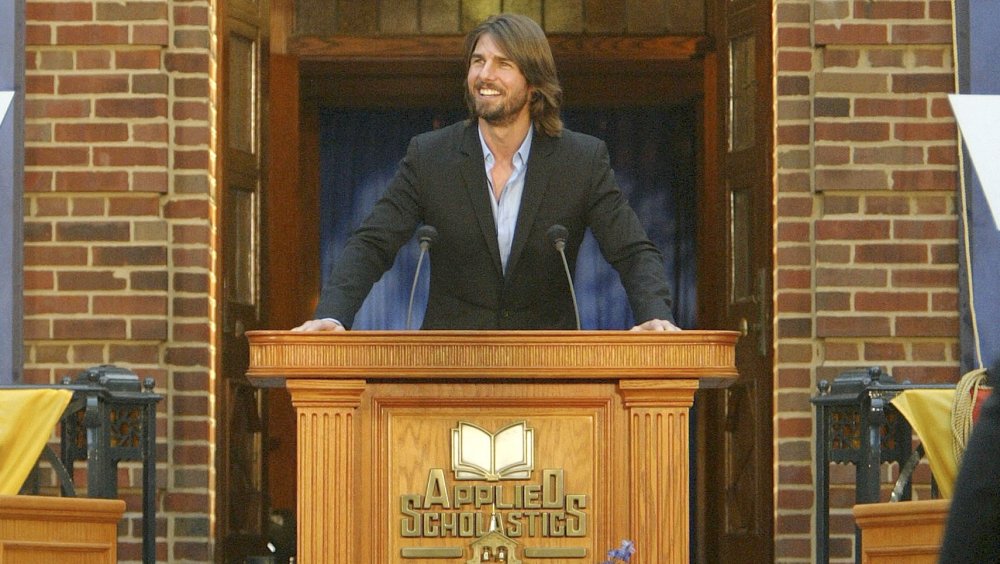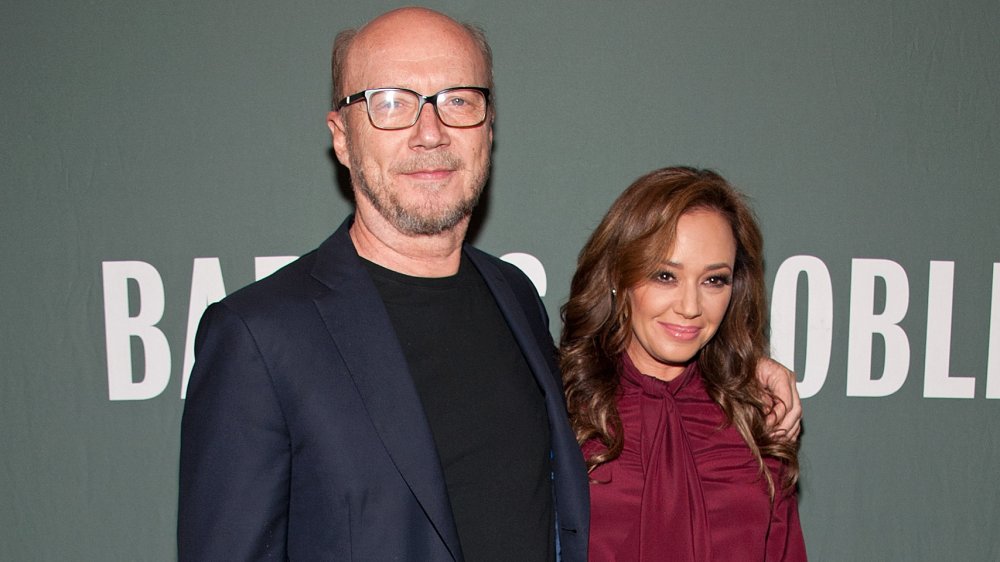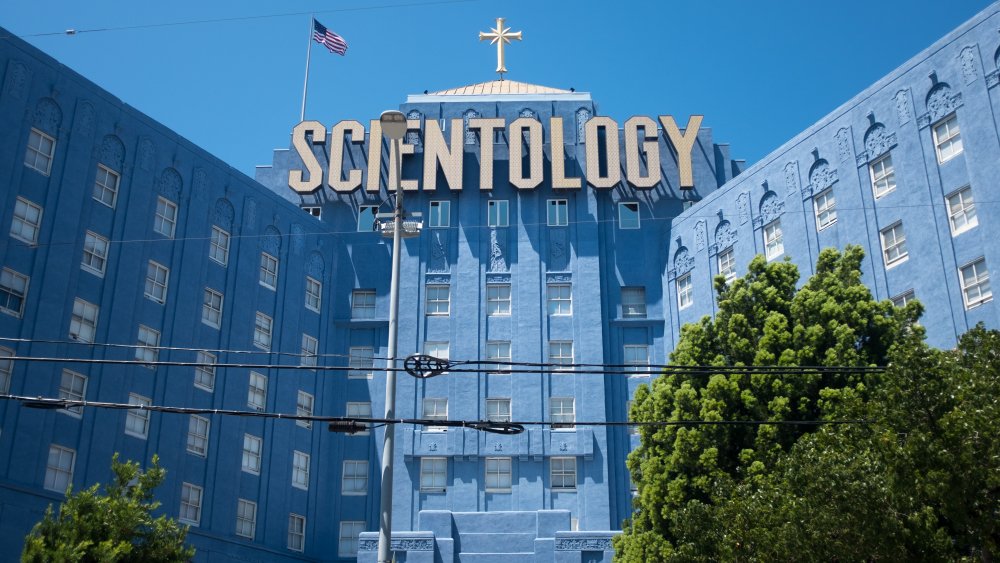Inside Leah Remini's Most Controversial Claims About Scientology
Scientology has been mired in controversy since the religion first sprouted from science-fiction writer L. Ron Hubbard's 1950 bestselling self-help book, Dianetics: The Modern Science of Mental Health. The overarching organization, the Church of Scientology International (CSI), describes itself as the "mother church of the Scientology religion." What started as an alternative to psychotherapy morphed into a religious organization that has been dogged for decades by whispers of brainwashing, grifting, and cult-like isolation.
High-profile members of CSI, including Tom Cruise, are so indoctrinated that there seems to be no light between their beliefs and those of the organization. Other celebrity Scientologists, like The King of Queens' Leah Remini, are forced to make grave personal sacrifices if they question, or ultimately decide to leave, the organization.
Remini was so disillusioned by what she experienced, she decided to use her elevated profile to expose what happens behind closed doors at the highest levels of Scientology. Her A&E documentary series, Leah Remini: Scientology and the Aftermath, has exposed the shocking treatment a legion of ex-Scientologists say they received at the hands of CSI. In response, CSI issued a statement to Rolling Stone, which read, in part, "Ms. Remini is being compensated for this show...[and] has repeatedly disparaged and exploited her former faith for profit and attention through a series of failed publicity stunts, culminating in her reality TV show featuring [defectors] who have been telling differing versions of the same false tales of abuse for years."
Let's dive into some of those tales.
The shocking truth behind The Bridge to Total Freedom
Scientologists believe the human brain is reactive, processing trauma in ways that cloud the mind from seeing clearly. The primary Scientology goal is to reach a "clear" state, in which the mind becomes purely rational, freeing up previously encumbered abilities. Scientologists attempt to rid their "preclear" reactive mind through a process called "auditing." During auditing, members are connected to an "e-meter" that supposedly reads electrical pulses while a church leader asks about experiences in their life. CSI claims, "Only auditing provides ... an exact route to higher states of spiritual awareness." After completing levels on the path to "clear," which are detailed on the organization's Classification, Gradation and Awareness Chart called "The Bridge to Total Freedom," members strive to attain higher "OT" levels that purportedly eradicate spiritual beings attached to humans by a galactic leader 75 million years ago (via The Hollywood Reporter).
When Church founder L. Ron Hubbard (above in a 1959 file photo) died in 1986, Scientologists were told he had chosen to discard his physical body to explore higher levels of spiritual enlightenment. Hubbard actually died of a stroke, per the New York Times, but Remini says the only way CSI could move forward with a new leader was by claiming Hubbard was on a continued spiritual journey by choice. "All of this is bulls**it," she says (via Business Insider), but Scientologists needed to believe Hubbard had leveled up, rather than simply getting leveled.
Being a Scientologist will cost you
Scientology and the Aftermath explores the structure of CSI's "Bridge to Total Freedom." Remini says prospective members are reeled in by inexpensive "throwaway" introductory courses designed to indoctrinate members to the Bridge. Remini and her frequent co-host, former CSI spokesperson Mike Rinder (above left), say the texts of the core Scientology curriculum, twelve books written by L. Ron Hubbard, cost members about $4,000. The most expensive part of the Bridge by far, though, is auditing, which can cost members up to "$800 an hour" (via Business Insider).
Auditing, while touted as therapeutic, is not used solely to eradicate spiritual stagnation. Members are sometimes interrogated during these prepaid sessions in what Remini claims are called "Security Checks." This can occur if a member is suspected of breaking a rule or being influenced by sources outside of the organization. Members are at the mercy of CSI leaders, who decide, based on e-meter readings, whether a person is lying, in a state of spiritual distress, or lacking the clarity to advance to the next step of the Bridge. Even those who complete the program are sometimes forced to repeat (and pay for) it from the beginning. Learn Religions estimates a Scientologist will spend more than $250,000 to reach the highest level of enlightenment attainable. Remini and Rinder say it can easily top half a million (via The Hollywood Reporter). The Church does not appear to have issued a statement contradicting these specific claims about cost.
Scientologist are not friendly with reporters
Tony Ortega, a journalist who has written about Scientology since 1995, when he was the editor of The Village Voice, appeared on Scientology and the Aftermath with fellow journalist John Sweeney to discuss being named an "Enemy of the Church." Ortega created a website dedicated to exposing CSI, The Underground Bunker, which is a term he frequently used to joke about hiding in an undisclosed location to avoid harassment from the Church of Scientology. Ortega told Variety he hopes the public attention on Scientology will inspire "people to learn about Scientology and its legal history, and some of the things they've put people through who just dared to talk about what they really do behind closed doors, and the bullying they do." Sweeney has reported being followed and harassed by CSI leader and L. Ron Hubbard successor, David Miscavige.
Harassment of reporters is part of CSI's "fair game" practice, says former Scientologist Mike Rinder. When CSI determines a person or entity poses a threat to the organization, this threat justifies using nearly any means to an end to neutralize the threat, including being "tricked, sued or lied to or destroyed" (via Rolling Stone). CSI created a website to refute many of Remini's claims, and its response to this claim was to say the "fair game" practice "was cancelled in 1968 by the Founder, nearly five decades ago." Rinder contends the practice simply went underground to be discussed only among the highest echelons of the organization.
The Church of Scientology does not accept psychiatry as a valid practice
When the ideas expressed in Dianetics were not embraced by the psychiatric community, L. Ron Hubbard decided to eschew psychiatry and promote his system of treating mental illness as superior (via NIH). During a Reddit AMA, Remini said Scientologists "deny mental illness and afflictions...They will prevent people from getting the real medical help that they need, and in some cases have caused suicides because of it."
Ex-member Brandon Reisdorf says he received abusive "treatment" at the hands of the church, including being locked in a room during manic episodes and put through a process called "Introspection Rundown" (via The Underground Bunker), which amounts to being locked up in isolation until he was calm. But the procedure backfired. Brandon's father said he "came back worse than when he went in." After leaving Scientology, Reisdorf was diagnosed with bipolar disorder, but before stabilizing on medication, he threw a hammer through a church window when he realized his brother, who remained with the church, would no longer communicate with him.
CSI responded to the story about Reisdorf saying, in part, "The Reisdorfs...actually try to blame their former religion for a violent attack against the Los Angeles Church by their son Brandon in which he was arrested and charged by authorities before pleading guilty." CSI allegedly complained about the TV appearance to Reisdorf's probation officer, but nothing came of it because no laws or probation terms were broken.
Church leader David Miscavige is allegedly abusive
Power is currency. Scientology and the Aftermath explores the history of the Church of Scientology's leadership, including the manner in which CSI's current leader, David Miscavige (above), rose to the most powerful position in the organization following L. Ron Hubbard's death. Miscavige reportedly used whatever means he deemed necessary to clear his way to power, including physical force.
The show featured accusations from several former CSI leaders who allege Miscavige was violent. Mike Rinder told the Tampa Bay Times that Miscavige had "attacked him some 50 times." Former CSI marketing executive Jeff Hawkins said (via Dayton Daily News) Miscavige "was a mean guy" who "physically assaulted me five separate times." On the show, Hawkins tells the story of Miscavige jumping on a table to propel himself at Hawkins, then knocking him against a wall and "hammering [his] face." Another former Church executive, Tom DeVocht, tells the story of being unable to get a sidewalk permit Miscavige requested, and "before [he] could even think [Miscavige] dove across the table, grabbed [DeVocht's] tie, and shoved it up," restricting his airway to the point where he "couldn't breathe" or "talk." CSI has strongly denied all claims of violence.
Scientology is desperate to keep celebrity members
Remini states it plainly on the show (via Business Insider), "The Church of Scientology is a business. And like any business, they like to have a celebrity selling it." L. Ron Hubbard created "Project Celebrity" (via Xenu.net archives) in 1955 to recruit well-known figures in sports, film, music, and writing to Scientology, and he offered rewards to anyone who could recruit celebrities. Los Angeles Magazine reported, "The media-savvy Hubbard recognized early on that famous people were a potent lure to attract new members. He assiduously catered to stars and established well-appointed 'Celebrity Centres' in various cities."
Remini says celebrities are "serviced differently ... there were Sea Org members working for celebrities in their homes. ... I know of one celeb who had a Sea Org member working in their home, and Sea Org members were averaging $25/week." Amy Scobee, who was in charge of Tom Cruise's staff, was told to hire only Scientologists to be in his orbit. "Scientology concentrates on collecting celebrities," Scobee said. "The ultimate goal is for celebs to be the 'walking success stories' of Scientology." CSI has a long list of celebrity ex-members, as well.
Steven Kent, co-editor of Scientology in Popular Culture, told FOLIO, "The curious irony in all of this is that the trends Hubbard exploited so successfully when he created Scientology in the 1950s — emerging communications technology and the power of popular culture, especially celebrity recruitment — are the very forces conspiring against it now.
Scientology's tax-exempt status is part of its 'war against the government'
The Church of Scientology's website says, "The IRS issued ruling letters on 1 October 1993, recognizing the tax-exempt religious and charitable status of the Church of Scientology International, the Mother Church of the Scientology religion, and 150 affiliated Churches, missions and social betterment organizations."
The New York Times reported that, along with news of CSI's tax-exempt designation, the Church of Scientology had federal tax-exemption status between 1957 and 1967, but lost it when government officials determined "although Scientology can be considered a religion, its affiliated organizations had operated as businesses for the financial gain of the church's leaders, most notably L. Ron Hubbard." Hubbard, whose standard practice was naming any person or entity challenging the church an "enemy," then added anti-government verbiage to the official position of the church, which Miscavige continued until, as former Scientologist Aaron Smith-Levin says in Scientology and the Aftermath (Rolling Stone), Scientology "won the war against the government" by gaining tax-exempt status in 1993.
Even this arrangement between Scientology and the IRS was secretive. Apparently, this settlement closed several standing lawsuits, including some that date all the way back to the church's founding! But the battle is not over just yet. There are still many questions about the Church's validity as a religious organization, and, according to HuffPost, even Donald Trump reportedly wants the organization's status revoked.
Does Scientology actually have a prison camp?
CSI's oppressive retention policies, and the lengths to which they will go to reign in ex-members, according to The St. Petersburg Times (via Gawker), include alleged stalking, blackmail, and physical intimidation. They also reportedly utilize guards and barbed fences! Amy Scobee revealed on Leah Remini's show (via Rolling Stone) that she and her husband were sent to a prison camp, the Rehabilitation Project Force, which CSI benignly describes a rehabilitation camp for members of Sea Org, the church's elite "religious order," who "have failed to fulfill their ecclesiastical responsibilities." Former members call it "the hole." The Scobees decided to leave Scientology after "repeated stints" at the camp, where they claim they were guarded round-the-clock with a personal detail. A New Yorker exposé in 2011 revealed CSI was under investigation for human trafficking by the FBI for forced labor, including that of minors, and imprisonment. A 2019 lawsuit, according to NBC News, made the same accusations, which the church vehemently denies.
"The reasons for [being sent to the hole] could be anything," Rinder said on the show (via Rolling Stone), adding, "From answering a question wrongly, not answering a question, a facial expression that was inappropriate, falling asleep after being up for a couple of days." In an interview with Tony Ortega for The Village Voice, Rinder said one of the reasons he stayed with the church so long was an "incremental increase in degradation."
CSI simply told ABC News, "The Hole does not exist."
The church's alleged pattern of sexual assault and cover up
According to The Hollywood Reporter, Remini decided to end her critically-acclaimed television show as it began: with a focus on abuse allegations. "When I asked [a live audience of 75 ex-Sea Org members], 'How many of you had a sexual crime committed against you in Scientology or SeaOrg or know of somebody who was molested or raped,' every single person raised their hand."
In response to a June 2020 AP post announcing rape charges against the That '70s Show actor, Scientologist Danny Masterson, Remini tweeted, "Finally, victims are being heard when it comes to Scientology! Praise the lord! This is just the beginning Scientology, your days of getting away with it is coming to an end!" A lawsuit from Masterson's accusers (via The Blast) alleges that CSI's harassment of them amounted to stalking. Both Masterson and church officials strongly deny all accusations relating to the lawsuit.
On one episode of Remini's show, former Scientologist Amy Scobee also claimed her 35 year old boss took advantage of her when she was 14. "He was married and he had me stay back when everybody else left, and basically we had sex," she said (via Elle). "This was statutory rape, and I was too afraid to tell anyone about it. ... They indoctrinated in me that if anything serious goes on, it's handled internally.
The church responded to Remini (via USA Today), in part, stating, "In regards to your allegations on condoning sexual abuse, this is false and defamatory."
Remini does defend one former Scientologist accused of sexual assault allegations
When reports emerged that four women had accused former Scientologist and flimmaker Paul Haggis (above left) of sexual assault, Mike Rinder and Leah Remini posted an open letter in his defense, which read (in part), "We expect the next 'revelations' about Paul Haggis in this campaign to destroy him to be based on information culled from his Scientology files in the form of more 'anonymous' accusers, hiding behind a lawyer who will never have to disclose who is paying their bill. Those who accuse without going to law enforcement, those who seek hush money to keep their stories secret, those who make accusations to the media anonymously — they are suspect. And when the target of these tactics is someone who is a prominent critic of Scientology, it is very suspect."
According to the Daily Beast, Haggis' one on-the-record accuser (the other three remain anonymous as of this writing) offered contemporaneous anecdotal evidence and says her allegations, and she, have nothing to do with Scientology. Haggis contends his encounter with this accuser was consensual. Remini didn't offer further comment to the Daily Beast, but Rinder explained the accuser's lack of Scientology links as irrelevant, because "you can get all sorts of people to do all sorts of things."
Sea Org members are reportedly forced to have abortions
Members of the Sea Organization, the elite group at the highest levels of CSI, sign a billion-year contract to remain a Scientologist when they join. Children are not allowed, but Sea Org members allegedly include many teens whose parents signed away legal guardianship. Former Sea Organization member Claire Headley was 17 when she got pregnant with her now-husband Marc Headley's baby. She claimed on Leah Remini's show (via the Daily News) that she was forced to have an abortion. "If a woman got pregnant, she would instantly be scheduled to get an abortion," said Claire. "If she refused in any manner she would be segregated, not allowed to speak with her husband, put under surveillance, put under security watch, put under manual labor, and interrogated for her crimes as to why she wanted to leave." The Headleys ultimately left the church.
Scientology responded with a letter that reads, "The Church does not pressure, coerce or compel anyone to have or not have an abortion...members of the Sea Organization, decide for themselves. Members of the Sea Organization are informed in advance that while they can marry and cohabit, they may not raise children while in the religious order. This is a practical rule due to the rigors of a life dedication to religious work, study, and self-realization. It is not uncommon for members of the Sea Organization to leave to have children while remaining Scientologists and return to the religious order when their children are grown."
The devastating effects Scientology has on families
Leah Remini examines "disconnection" in the series' very first episode. Per Business Insider, Remini claims that Scientologists' belief in reincarnation makes it easier for members to disconnect from their families because they believe they have several biological families throughout their lifetimes as a spiritual being. A Scientology screening tool, the "Chart of Human Evaluation" helps members decide who is worthy of their time and attention. Executive Director of the Cult Education Institute Rick Ross says (via FOX News), "The public should know that Scientology has routinely declared people SP (a suppressive person) and then encouraged Scientologists, including family members, to disconnect from SPs or risk being labeled a PTS (Potential Trouble Source). This policy has hurt many families."
An immensely high-profile family split was that of Church of Scientology leader David Miscavige. His father, Ron, describes the security measures like locked doors and spiked gates as being designed to both keep members in and keep strangers out. Many were cut off from the outside world by any feasible means, but David gave his father a gadget that gave him access to the outside world: an internet-connected Kindle. Remini said (via Business Insider), "Ron just Googled 'Scientology' and he was hard-pressed to find anything good that the world was saying." Ron and his wife left the church in 2011, after 42 years. They were immediately cut off from their children and other loved ones who remained Scientologists.

